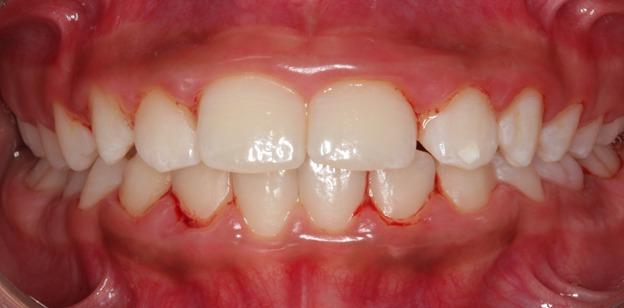A study led by researchers at the University of Campinas reinforces the need for prevention and follow-up treatment starting in early childhood to avoid development of this inflammatory disease of the gums.

Credit: Mabelle de Freitas Monteiro
By Luciana Constantino | Agência FAPESP – Adults with periodontitis transmit bacteria that can cause the disease in future to their children, and the bacteria remain in the oral cavity even when the children undergo treatment of various kinds, reinforcing the need for preventive care in the first year of a baby’s life. This is the main conclusion of a study conducted at the University of Campinas (UNICAMP) in the state of São Paulo, Brazil. An article on the study is published in Scientific Reports.
Periodontitis is an inflammation of the periodontium, the tissue that supports the teeth and maintains them in the maxillary and mandibular bones. The disease is triggered by bacterial infection. Symptoms include bleeding of the gums and halitosis. In severe cases, it leads to bone and tooth loss. If the bacteria or other microorganisms that cause the disease enter the bloodstream, they may trigger other kinds of inflammation in the body. Treatment includes cleaning of the pockets around teeth by a dentist or hygienist and administration of anti-inflammatory drugs or antibiotics.
“The parents’ oral microbiome is a determinant of the subgingival microbial colonization of their children,” the article’s authors state in their conclusions, adding that “dysbiotic microbiota acquired by children of periodontitis patients at an early age are resilient to shift and the community structure is maintained even after controlling the hygiene status”.
According to dental surgeon Mabelle de Freitas Monteiro, first author of the article, she and her group have been researching periodontitis for ten years, observing parents with the disease and its impact on their children’s health.
“If the findings are applied to day-to-day dental practice, the study can be said to help design more direct approaches. Knowing that periodontal disease may affect the patient’s family is an incentive to use preventive treatment, seek early diagnosis and mitigate complications,” said Monteiro, who was supported by FAPESP via two projects (16/03704-7 and 16/19970-8).
The principal investigator for both projects was Renato Corrêa Viana Casarin, a professor at UNICAMP’s Piracicaba Dental School (FOP) and last author of the article.
For Casarin, parents should start caring for the health of their children’s gums when they are infants. “This pioneering study compares parents with and without periodontitis. In children of the former, we found subgingival bacterial colonization at a very early age. However, ‘inheriting’ the problem doesn’t mean a child is fated to develop the disease in adulthood. Hence the importance of keeping an eye open for the smallest signs and seeking specialized help,” Casarin said.
Data on the Brazilian population’s oral health is scarce. According to the last national dental epidemiological survey, conducted by the Ministry of Health in 2010, 18% of children aged 12 had never been to the dentist and 11.7% had experienced bleeding of the gums. In the 15-19 age group, 13.6% had never visited a dental clinic. Another survey was scheduled for 2020 but had to be postponed because of the COVID-19 pandemic.
The São Paulo State Department of Health published the findings of its latest oral health survey in 2019, showing among other things that 50.5% of adults aged 35-44 complained of toothache, bleeding gums and periodontitis (read more at: agencia.fapesp.br/30260/).
Bacteria
In the FOP-UNICAMP study led by Casarin and Monteiro, samples of subgingival biofilm and plaque were collected from 18 adults with a history of generalized aggressive (grade C) periodontitis, their children aged 6-12, and 18 orally healthy adults.
In addition to a clinical analysis, the samples were also subjected to a microbiological analysis and genetic sequencing by researchers at Ohio State University in the United States under the supervision of Professor Purnima Kumar.
“Children of periodontitis parents were preferentially colonized by Filifactor alocis, Porphyromonas gingivalis, Aggregatibacter actinomycetemcomitans, Streptococcus parasanguinis, Fusobacterium nucleatum and several species belonging to the genus Selenomonas even in the absence of periodontitis,” the article states. “These pathogens also emerged as robust discriminators of the microbial signatures of children of parents with periodontitis.”
Casarin told Agência FAPESP that despite bacterial plaque control and vigorous brushing the children of people with the disease still had the bacteria in their mouths, whereas the effects of dental hygiene and prophylaxis were more significant in the children of healthy subjects.
“Because the parents had periodontitis, their children assumed this community with disease characteristics. They carried the bacterial information into their adult lives,” he said, adding that the analysis of bacterial colonization pointed to a greater likelihood of transmission by the mother. The research group will now work with pregnant women in an effort to “break the cycle” by preventing bacterial colonization of their children’s mouths.
“We’ll treat the mothers during pregnancy, before the babies are born, and try to find out if it’s possible to prevent bacterial colonization from occurring,” Casarin said, noting that studies with patients will proceed only when control of the pandemic permits.
Recognition
The periodontitis research group led by Casarin has won prizes at home and abroad. In 2019, Monteiro topped the clinical research category of the IADR’s Hatton Competition. The IADR (International Association for Dental Research) hosts the world’s leading conference on dentistry, and the competition is designed to provide an opportunity for the best junior investigators to present their research (read more in Portuguese at: www.fop.unicamp.br/index.php/pt-br/doi-odontopediatria/2352.html).
Years earlier the group won an award from the American Academy of Periodontology for the study with the most significant clinical impact.
The article “Parents with periodontitis impact the subgingival colonization of their offspring” is at: www.nature.com/articles/s41598-020-80372-4.
Media Contact
heloisa reinert
[email protected]
Original Source
https:/
Related Journal Article
http://dx.




